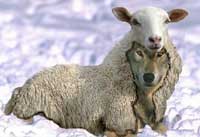FALSE PROPHETS ARE DECEPTIVE
By Ken Silva pastor-teacher on Jul 2, 2012 in Devotions
“Beware of the false prophets, who come to you in sheep’s clothing, but inwardly are ravenous wolves.” (Matthew 7:15)
False prophets are most dangerous because of their deceptive nature. We can easily recognize and defend against an enemy that poses for what it is. But when that enemy appears as a friend, it is much harder to defend against.
Heretics and apostates make no claim to biblical truth and are recognizable. But deceivers disguise themselves as true shepherds. They give the appearance of orthodoxy and claim to teach the truth, but their intent is to deceive and destroy God’s people.
Paul explains this phenomenon:
“For such men are false apostles, deceitful workers, disguising themselves as apostles of Christ. No wonder, for evenSatan disguises himself as an angel of light. Therefore it is not surprising if his servants also disguise themselves as servants of righteousness, whose end will be according to their deeds” (2 Corinthians 11:13-15; cf. 2 Timothy 3:13).
Such false prophets are demonically deceived, convinced that their perverted, distorted views are correct. They are so steeped in falsehood that darkness seems to be light, blackness white, and error truth.
This calls for genuine discernment. But how is this best done? It’s by realizing that such men show themselves by what they do not say—they seldom affirm the great doctrines of the church, but rather ignore them.
In our day of confusion and indifference, we need to pray and vigilantly “test the spirits to see whether they are from God… Every spirit that confesses that Jesus Christ has come in the flesh is from God” (1 John 4:1, 2). ((John MacArthur, Daily Readings From the Life of Christ [Chicago: Moody, 2008], July 2))
John MacArthur
